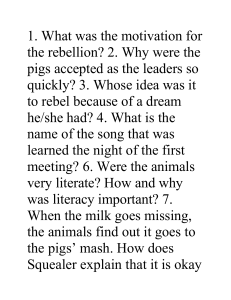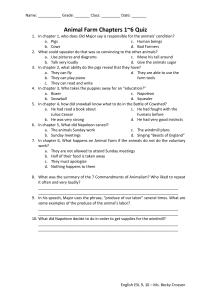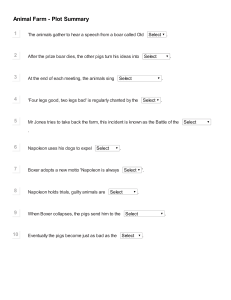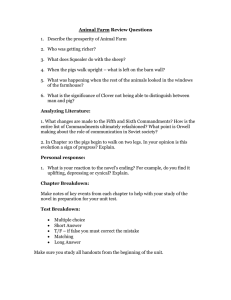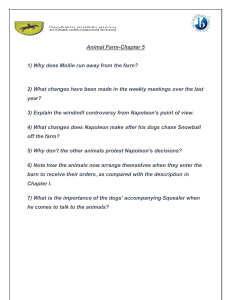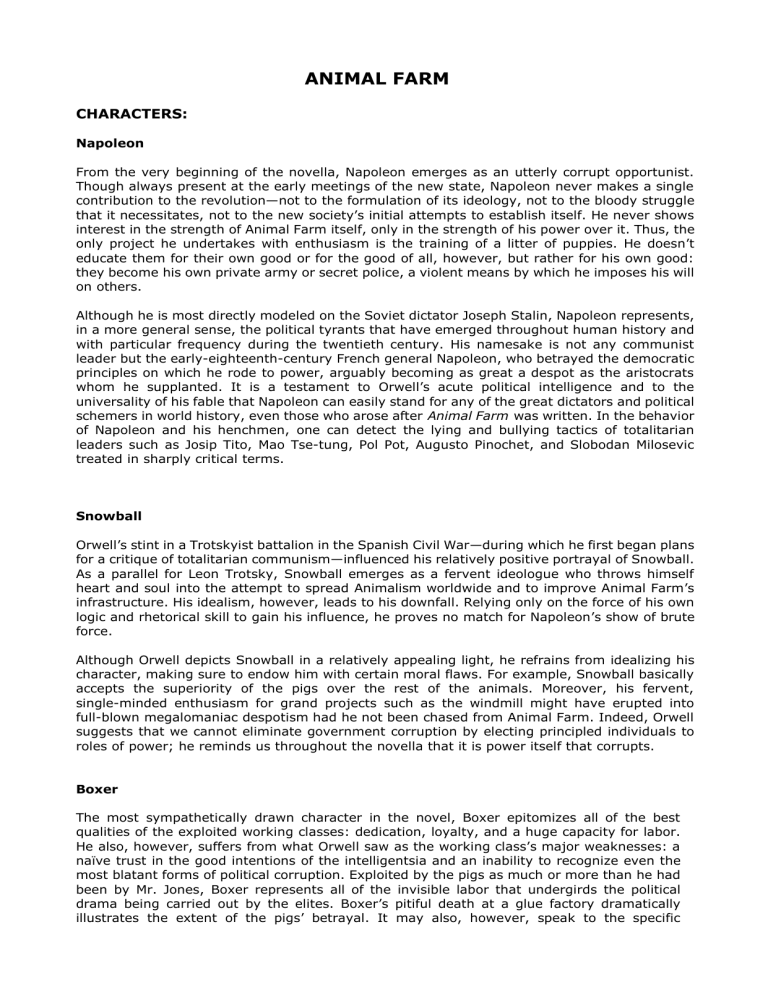
ANIMAL FARM CHARACTERS: Napoleon From the very beginning of the novella, Napoleon emerges as an utterly corrupt opportunist. Though always present at the early meetings of the new state, Napoleon never makes a single contribution to the revolution—not to the formulation of its ideology, not to the bloody struggle that it necessitates, not to the new society’s initial attempts to establish itself. He never shows interest in the strength of Animal Farm itself, only in the strength of his power over it. Thus, the only project he undertakes with enthusiasm is the training of a litter of puppies. He doesn’t educate them for their own good or for the good of all, however, but rather for his own good: they become his own private army or secret police, a violent means by which he imposes his will on others. Although he is most directly modeled on the Soviet dictator Joseph Stalin, Napoleon represents, in a more general sense, the political tyrants that have emerged throughout human history and with particular frequency during the twentieth century. His namesake is not any communist leader but the early-eighteenth-century French general Napoleon, who betrayed the democratic principles on which he rode to power, arguably becoming as great a despot as the aristocrats whom he supplanted. It is a testament to Orwell’s acute political intelligence and to the universality of his fable that Napoleon can easily stand for any of the great dictators and political schemers in world history, even those who arose after Animal Farm was written. In the behavior of Napoleon and his henchmen, one can detect the lying and bullying tactics of totalitarian leaders such as Josip Tito, Mao Tse-tung, Pol Pot, Augusto Pinochet, and Slobodan Milosevic treated in sharply critical terms. Snowball Orwell’s stint in a Trotskyist battalion in the Spanish Civil War—during which he first began plans for a critique of totalitarian communism—influenced his relatively positive portrayal of Snowball. As a parallel for Leon Trotsky, Snowball emerges as a fervent ideologue who throws himself heart and soul into the attempt to spread Animalism worldwide and to improve Animal Farm’s infrastructure. His idealism, however, leads to his downfall. Relying only on the force of his own logic and rhetorical skill to gain his influence, he proves no match for Napoleon’s show of brute force. Although Orwell depicts Snowball in a relatively appealing light, he refrains from idealizing his character, making sure to endow him with certain moral flaws. For example, Snowball basically accepts the superiority of the pigs over the rest of the animals. Moreover, his fervent, single-minded enthusiasm for grand projects such as the windmill might have erupted into full-blown megalomaniac despotism had he not been chased from Animal Farm. Indeed, Orwell suggests that we cannot eliminate government corruption by electing principled individuals to roles of power; he reminds us throughout the novella that it is power itself that corrupts. Boxer The most sympathetically drawn character in the novel, Boxer epitomizes all of the best qualities of the exploited working classes: dedication, loyalty, and a huge capacity for labor. He also, however, suffers from what Orwell saw as the working class’s major weaknesses: a naïve trust in the good intentions of the intelligentsia and an inability to recognize even the most blatant forms of political corruption. Exploited by the pigs as much or more than he had been by Mr. Jones, Boxer represents all of the invisible labor that undergirds the political drama being carried out by the elites. Boxer’s pitiful death at a glue factory dramatically illustrates the extent of the pigs’ betrayal. It may also, however, speak to the specific significance of Boxer himself: before being carted off, he serves as the force that holds Animal Farm together. Squealer Throughout his career, Orwell explored how politicians manipulate language in an age of mass media. In Animal Farm, the silver-tongued pig Squealer abuses language to justify Napoleon’s actions and policies to the proletariat by whatever means seem necessary. By radically simplifying language—as when he teaches the sheep to bleat “Four legs good, two legs better!”—he limits the terms of debate. By complicating language unnecessarily, he confuses and intimidates the uneducated, as when he explains that pigs, who are the “brainworkers” of the farm, consume milk and apples not for pleasure, but for the good of their comrades. In this latter strategy, he also employs jargon (“tactics, tactics”) as well as a baffling vocabulary of false and impenetrable statistics, engendering in the other animals both self-doubt and a sense of hopelessness about ever accessing the truth without the pigs’ mediation. Squealer’s lack of conscience and unwavering loyalty to his leader, alongside his rhetorical skills, make him the perfect propagandist for any tyranny. Squealer’s name also fits him well: squealing, of course, refers to a pig’s typical form of vocalization, and Squealer’s speech defines him. At the same time, to squeal also means to betray, aptly evoking Squealer’s behavior with regard to his fellow animals. Old Major As a democratic socialist, Orwell had a great deal of respect for Karl Marx, the German political economist, and even for Vladimir Ilych Lenin, the Russian revolutionary leader. His critique of Animal Farm has little to do with the Marxist ideology underlying the Rebellion but rather with the perversion of that ideology by later leaders. Major, who represents both Marx and Lenin, serves as the source of the ideals that the animals continue to uphold even after their pig leaders have betrayed them. Though his portrayal of Old Major is largely positive, Orwell does include a few small ironies that allow the reader to question the venerable pig’s motives. For instance, in the midst of his long litany of complaints about how the animals have been treated by human beings, Old Major is forced to concede that his own life has been long, full, and free from the terrors he has vividly sketched for his rapt audience. He seems to have claimed a false brotherhood with the other animals in order to garner their support for his vision. Mr. Pilkington Mr. Pilkington is the owner of Foxwood, a farm near Animal Farm. He is introduced as “an easy-going gentleman farmer who spent most of his time in fishing or hunting according to the season” (Chapter 4). In other words, he is more interested in doing what he enjoys than in running his farm. As a result, Foxwood is “neglected, old-fashioned” (Chapter 4). Within Animal Farm’s allegory of Soviet Communism, Foxwood represents the United Kingdom, and Mr. Pilkington represents the British ruling class. Animal Farm therefore suggests that Britain is an old-fashioned country, badly run by self-serving aristocrats. This criticism of Britain’s rulers deepens when Mr. Pilkington eats dinner with the pigs in the novella’s final chapter. Mr. Pilkington congratulates Napoleon on his cruel efficiency. He jokes: “If you have your lower animals to contend with […] we have our lower classes!” (Chapter 10). This moment crystallizes the novella’s argument that Soviet totalitarianism and British capitalism are essentially the same: cruel and exploitative. Benjamin Benjamin is Animal Farm’s donkey. He is intelligent and able to read, but he “never exercised his faculty. So far as he knew, he said, there was nothing worth reading” (Chapter 3). He is the only animal who never really believes in the rebellion, but he doesn’t oppose it, and he doesn’t oppose Napoleon’s rise to power either. When the animals ask him to help them by reading the Commandments which have been changed on Napoleon’s orders, Benjamin refuses “to meddle in such matters” (Chapter 8). Within the novella’s allegory of Soviet history, Benjamin represents the intellectuals who failed to oppose Stalin. More broadly, Benjamin represents all intellectuals who choose to ignore politics. Benjamin pays a high price for his refusal to engage with the Farm’s politics. When he finally tries to take action and save his best friend, Boxer, it is already too late. THEMES The Corruption of Socialist Ideals in the Soviet Union Animal Farm is most famous in the West as a stinging critique of the history and rhetoric of the Russian Revolution. Retelling the story of the emergence and development of Soviet communism in the form of an animal fable, Animal Farm allegorizes the rise to power of the dictator Joseph Stalin. In the novella, the overthrow of the human oppressor Mr. Jones by a democratic coalition of animals quickly gives way to the consolidation of power among the pigs. Much like the Soviet intelligentsia, the pigs establish themselves as the ruling class in the new society. The struggle for preeminence between Leon Trotsky and Stalin emerges in the rivalry between the pigs Snowball and Napoleon. In both the historical and fictional cases, the idealistic but politically less powerful figure (Trotsky and Snowball) is expelled from the revolutionary state by the malicious and violent usurper of power (Stalin and Napoleon). The purges and show trials with which Stalin eliminated his enemies and solidified his political base find expression in Animal Farm as the false confessions and executions of animals whom Napoleon distrusts following the collapse of the windmill. Stalin’s tyrannical rule and eventual abandonment of the founding principles of the Russian Revolution are represented by the pigs’ turn to violent government and the adoption of human traits and behaviors, the trappings of their original oppressors. Although Orwell believed strongly in socialist ideals, he felt that the Soviet Union realized these ideals in a terribly perverse form. His novella creates its most powerful ironies in the moments in which Orwell depicts the corruption of Animalist ideals by those in power. For Animal Farm serves not so much to condemn tyranny or despotism as to indict the horrifying hypocrisy of tyrannies that base themselves on, and owe their initial power to, ideologies of liberation and equality. The gradual disintegration and perversion of the Seven Commandments illustrates this hypocrisy with vivid force, as do Squealer’s elaborate philosophical justifications for the pigs’ blatantly unprincipled actions. Thus, the novella critiques the violence of the Stalinist regime against the human beings it ruled, and also points to Soviet communism’s violence against human logic, language, and ideals. The Societal Tendency Toward Class Stratification Animal Farm offers commentary on the development of class tyranny and the human tendency to maintain and reestablish class structures even in societies that allegedly stand for total equality. The novella illustrates how classes that are initially unified in the face of a common enemy, as the animals are against the humans, may become internally divided when that enemy is eliminated. The expulsion of Mr. Jones creates a power vacuum, and it is only so long before the next oppressor assumes totalitarian control. The natural division between intellectual and physical labor quickly comes to express itself as a new set of class divisions, with the “brainworkers” (as the pigs claim to be) using their superior intelligence to manipulate society to their own benefit. Orwell never clarifies in Animal Farm whether this negative state of affairs constitutes an inherent aspect of society or merely an outcome contingent on the integrity of a society’s intelligentsia. In either case, the novella points to the force of this tendency toward class stratification in many communities and the threat that it poses to democracy and freedom. The Danger of a Naïve Working Class One of the novella’s most impressive accomplishments is its portrayal not just of the figures in power but also of the oppressed people themselves. Animal Farm is not told from the perspective of any particular character, though occasionally it does slip into Clover’s consciousness. Rather, the story is told from the perspective of the common animals as a whole. Gullible, loyal, and hardworking, these animals give Orwell a chance to sketch how situations of oppression arise not only from the motives and tactics of the oppressors but also from the naïveté of the oppressed, who are not necessarily in a position to be better educated or informed. When presented with a dilemma, Boxer prefers not to puzzle out the implications of various possible actions but instead to repeat to himself, “Napoleon is always right.” Animal Farm demonstrates how the inability or unwillingness to question authority condemns the working class to suffer the full extent of the ruling class’s oppression. The Abuse of Language as Instrumental to the Abuse of Power One of Orwell’s central concerns, both in Animal Farm and in 1984, is the way in which language can be manipulated as an instrument of control. In Animal Farm, the pigs gradually twist and distort a rhetoric of socialist revolution to justify their behavior and to keep the other animals in the dark. The animals heartily embrace Major’s visionary ideal of socialism, but after Major dies, the pigs gradually twist the meaning of his words. As a result, the other animals seem unable to oppose the pigs without also opposing the ideals of the Rebellion. By the end of the novella, after Squealer’s repeated reconfigurations of the Seven Commandments in order to decriminalize the pigs’ treacheries, the main principle of the farm can be openly stated as “all animals are equal, but some animals are more equal than others.” This outrageous abuse of the word “equal” and of the ideal of equality in general typifies the pigs’ method, which becomes increasingly audacious as the novel progresses. Orwell’s sophisticated exposure of this abuse of language remains one of the most compelling and enduring features of Animal Farm, worthy of close study even after we have decoded its allegorical characters and events. Corruption Animal Farm demonstrates the idea that power always corrupts. The novella’s heavy use of foreshadowing, especially in the opening chapter, creates the sense that the events of the story are unavoidable. Not only is Napoleon’s rise to power inevitable, the novella strongly suggests that any other possible ruler would have been just as bad as Napoleon. Although Napoleon is more power-hungry than Snowball, plenty of evidence exists to suggest that Snowball would have been just as corrupt a ruler. Before his expulsion, Snowball goes along with the pigs’ theft of milk and apples, and the disastrous windmill is his idea. Even Old Major is not incorruptible. Despite his belief that “all animals are equal,” (Chapter 1) he lectures the other animals from a raised platform, suggesting he may actually view himself as above the other animals on the farm. In the novel’s final image the pigs become indistinguishable from human farmers, which hammers home the idea that power inevitably has the same effect on anyone who wields it. The Failure of Intellect Animal Farm is deeply skeptical about the value of intellectual activity. The pigs are identified as the most intelligent animals, but their intelligence rarely produces anything of value. Instead, the pigs use their intelligence to manipulate and abuse the other animals. The novella identifies several other ways in which intelligence fails to be useful or good. Benjamin is literate, but he refuses to read, suggesting that intelligence is worthless without the moral sense to engage in politics and the courage to act. The dogs are nearly as literate as the pigs, but they are “not interested in reading anything except the Seven Commandments” (Chapter 3). The dogs’ use of their intelligence suggests that intellect is useless—even harmful—when it is combined with a personality that prefers to obey orders rather than question them. The Exploitation of Animals by Humans As well as being an allegory of the ways human exploit and oppress one another, Animal Farm also makes a more literal argument: humans exploit and oppress animals. While the animals’ rebellion is mostly comic in tone, it ends on a serious and touching note, when the animals “wipe out the last traces of Jones’s hated reign. The harness-room at the end of the stables was broken open; the bits, the nose-rings, the dog-chains, the cruel knives with which Mr. Jones had been used to castrate the pigs and lambs, were all flung down the well” (Chapter 2). The novella also suggests that there is a real connection, as well as an allegorical one, between the exploitation of animals and the exploitation of human workers. Mr. Pilkington jokes to Napoleon: “If you have your lower animals to contend with […] we have our lower classes!” (Chapter 10). From the point of view of the ruling class, animals and workers are the same.
